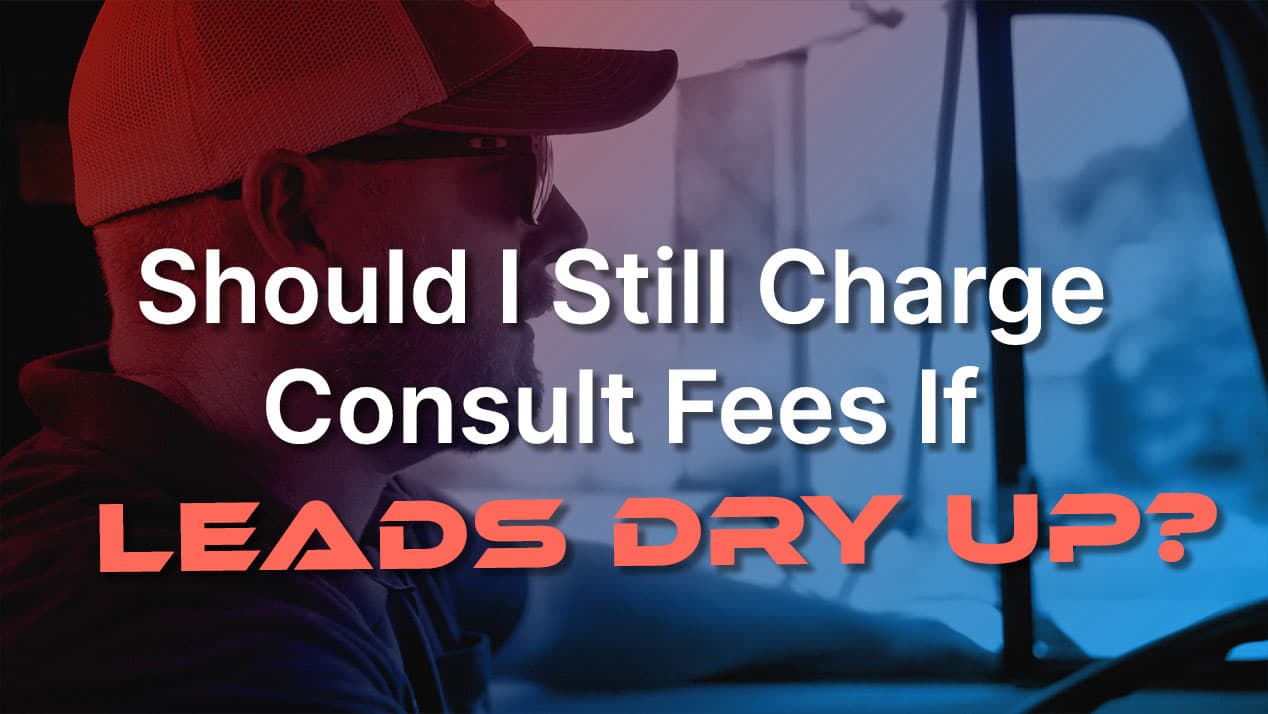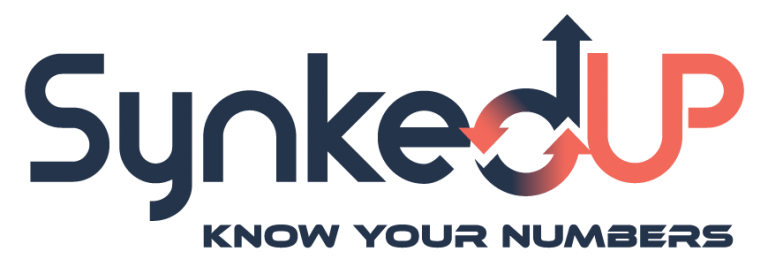Should I Still Charge Consult Fees if Leads Dry Up?

Still Charge Consult Fees?
I got a phone call from a SynkedUP user and friend yesterday, wanting to think out loud through the consultation fees he was charging. He had been charging $150 for a consultation for a few years now and hadn’t been getting any pushback.
Until now.
There was some new competition in town, and they weren’t charging any consultation fees. He did learn that their quotes were similar in price though, so it’s not like it was an apples-and-oranges comparison. They were chasing the same type of jobs, and charging similar rates. He had several leads tell him “well, these companies aren’t charging me fees to get an estimate, so I’m just going to get quotes from them.”
This, and the fact the volume of leads is a little less this year than last (for him in his local market) made him doubt the whole idea of charging consultation fees. I’m sure there are more of you out there facing this same reality, so I wanted to share kind of where we landed in our conversation in hopes that it’s helpful to more of you out there.
After about a 20 min conversation, here’s where we landed:
- The purpose of consultation fees is not to make money, it’s to save you time.
- He was still getting enough paid consult leads to fill his schedule
Consultation Fees are Not to Make Money
The purpose of these fees is not to make money, not even to recover your costs of gas and time. It is solely to filter out the leads that are not serious and not going to buy from you anyway. I don’t care if you charge $5. It’s the fact that a transaction is taking place that matters. You are not in the business of collecting consultation fees. You are in business to collect deposit checks. The consultation fee simply helps you get a deposit check more often, than if you weren’t charging a consult fee. Essentially saves you from wasting valuable time, and frees up time to spend with the NEXT lead that calls in, IS willing to pay your consultation fee, and is far more likely to give you a deposit check.
That, or you get to eat dinner with your family instead of driving out there to meet someone that was never going to buy from you anyway, whether they knew it or not.
Maybe they genuinely THOUGHT they were going to buy from you until they realized that their favorite backyard idea photo from the gram is going to cost $150-250k, and they were thinking $20-40k. Happens all the time.
Asking them to pay a consultation fee before coming out forces them to do a reality check and ask more questions over the phone or on your website. In about a 5 min phone conversation and/or a couple of text messages, they’ll be able to find out that yes, what they are looking for is in the $150-250k range, and they’ll thank you for your time and hang up. And you didn’t have to drive out there for them to discover that.
Side Tangent
Now suddenly your head starts thinking about “how can I educate the customer as to what things cost?” And you start burning your energy on how can you better educate your customers directly on your website and online presence, to save even that 5 min phone conversation. At Tussey Landscaping we did this with a Project Planner that the lead had to fill out AHEAD of time before the designer showed up for the scheduled consultation. It was more about educating the customer as to what things cost than it was to get their budget. Although getting their budget range is helpful.
The entire goal is to get your services to the right people. Your target audience is those that can and will buy from you. And avoid beating yourself up when you get the umpteenth “no” from a customer that was just not a good fit for your business to begin with. It’s a game of finding the RIGHT customer, not all customers.
Now, are there enough RIGHT customers in your market for the service you offer?
That’s a different question.
Maybe you sell Lambos but there just are not enough Lambo customers in your market. Maybe you need to expand your service offering that inherently expands the size of your target customer audience. But that’s completely different than trying to sell Lambos to customers with Impala budgets. That game is a game you’ll never win. Adding Impalas to your line of service offerings so you have something to sell to those customers with those budgets IS a game you can win.
Back to the consultation fee, it is there solely to make sure that if you sell Lambos; you’re talking to Lambo customers. It forces customers to do a quick reality check and ask themselves if they really ARE serious about buying. Saving both of you time.
Are you Getting Enough Leads to Fill Your Schedule?
This is the other question we discussed on our phone call. I asked him “Let’s say you keep on charging the consultation fees, will you get enough paid consultations to still fill your crew’s calendar?”
For him, the answer was yes. He’s booked to August already, and he’s confident he will easily fill the rest of the year. Even if he keeps right on charging for his consultations, and get’s a high percentage of no’s. For him, he only needs a few jobs to fill out the rest of the year.
It’s funny how the things that don’t even matter, torment and stress us out. So the volume of leads he got that were price shopping went up… Causing more people to refuse to pay his consult fee… which made him doubt his process. But when we were talking about it, stopped, and looked at the situation, he was still confident he’d sell what he needed to fill his schedule. Which let him logically process all those “no’s” and be ok with it, not stress out about it.
Now, there’s always cause to constantly be watching and evaluating your process. I’m not advocating being bullheaded about sticking to your process. There can be times when the process needs to adapt to external circumstances.
For example, if you needed hundreds of small jobs to fill out the rest of your year, that may be a different story. Consultation fees may not be an effective method, and you may need to find a different way to vet your leads to ensure they’re serious. That’s all that this is about anyway. Vetting your leads so you don’t waste time with people that never will buy from you anyway, robbing you of your precious time.
I hope there’s someone out there that needed this. If that was you, hit me up with a reply or comment. Or if you have another angle or argument to pitch into this discussion, I want to hear it.
Cheers!
Westons

Weston Zimmerman
CEO and co-founder
See SynkedUP in action
Related Articles
Why Cutting Costs Isn’t the Same as Saving Money
Cutting costs isn't the same as saving money. Learn how to use leverage, not panic, to drive real profit and...
Slow Down to Speed Up
A quick leadership gut check: Are you building what really matters? Slow down, realign, and lead with intention.
The One Calculation Every Contractor Should Know
Contractors: If you’re not factoring in overhead, you're not pricing right. Learn how to calculate breakeven and stop guessing your...
What Owns Your Day? Urgency or Importance?
Stuck in a cycle of chaos and urgent tasks? Break the cycle with better systems, clear processes, and leadership that...
Taking Care of Your Team
Leadership isn't barking orders - it's listening, appreciating, and building problem solvers. Here's how to lead without burning out.
The Cost of Avoiding Issues in Your Business
Avoiding stuff in business adds up, with interest. Don't try harder, build systems that make success default. Do hard things,...
Leveraging Your Job Data for More Accurate Estimates
Stop estimating from the gut. Track time, collect job data, and turn it into faster, more accurate production rates.
How the Best Contractors Ensure Profitability
Running over estimated hours is one of the biggest silent profit killers in contracting. Here's how to track it, catch...
How To: Rank Higher on Google Search
Learn how to rank at the top of Google without spending thousands. This simple, free strategy levels the playing field...
Costly Estimating Mistakes Contractors Make
Sanity check your estimates with 3 simple tips that help you avoid undercharging and building in real margin.











12 Responses
Yep I needed this! I just started consultation fees this year but not getting too many kick backs but enough to make me wonder if I’m doing the right thing! Thanks!
Absolutely Eric! Stay strong and carry on!
I Like it,Thanks for Sharing,
My pleasure brother. Have an amazing weekend!
Great post, we are in a smaller community with low budget and also high budget clients. Because we are in such a small town a lot of our work comes from word of mouth. This makes us feel good that we are providing quality work but also that these people probably know a little more about us from the previous client. We still get some leads from google and Facebook, but with everyone that calls it is always hard to get a budget out of them. I’ve have tried different methods but its is always “well we really don’t know how much this stuff cost” answer.
Would love to hear your thoughts, thanks!
I would 💯 use the project planner. It works extremely well to help clients understand what things cost. Shoot ridwaan@synkedup.com an email and tell him I sent you for the project planner. He can install it on any word press website for $2k+
I definitely want to do that on mine sometime this year. Just need more jobs! Thank you for the replies within the last few weeks!
You bet Charles! Good luck in getting those leads 🤙
I frequently get “well, we don’t know what this stuff costs” to the question “what are you thinking about for a budget”. Sigh. We all know it’s a silly response, because when I start asking if they’re looking to spend 100K, 75K, 50K, 25K, etc., all of the sudden, they have a budget. I’ve found that actually throwing rough numbers out there helps people at least give some indication of what they are willing or wanting to spend.
For sure Mark. Your comment made me think of Tom Reber from contractor fight. He talks alot about how to handle this conversation with a customer. He’s got a bunch of stuff on YouTube if you want to check it out.
Personally I’ve had better success with using the on-site consultation fee as step #2 in my process. Step #1 is more of a free virtual consultation to help clients come up with a budget – sort of a combination of your project planner and parts of Tom Reber’s process. Most clients who have never used a professional landscaper DON’T know where to start; it’s my job to help them without embarrassing them. Hitting them with a consultation fee too early in the process feels a little too elitist in a market where not everyone is using them, but asking potential clients to do a little homework to prepare free virtual consultation seems to help weed out the dreamers who aren’t ready to make an investment.
I like how you said “it’s OUR job to educate the customer, without embarrassing them.” Amen! Couldn’t agree more. I also like how you’re doing your process. I think every company will find their “groove” in this stuff, depending on the service you provide, the clientele you serve, etc. I could definitely see value in doing a free virtual meeting up front if the job sizes are worth it, and the frequency doesn’t kill your calendar. It’s all about not wasting time and energy at the end of the day. As long as you’re doing that, then I would call it successful.
Thanks for commenting and adding value Melissa!